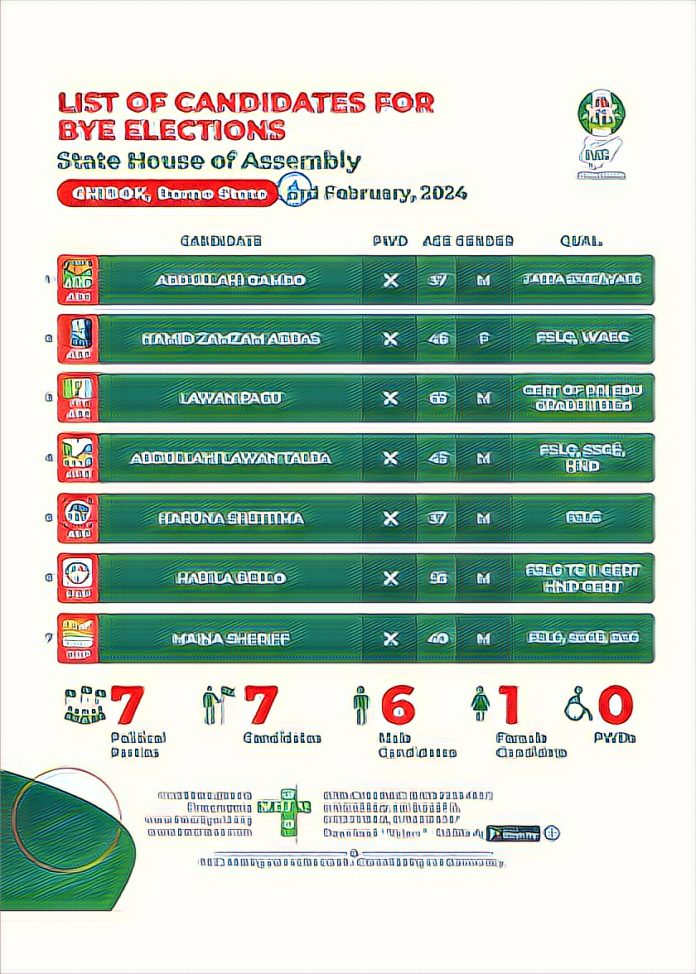The Independent National Electoral Commission (INEC) has published the final list and personal details of candidates for bye-elections scheduled for February 3, 2024.
The bye-elections will take place in nine states of the federation, covering two senatorial districts (Ebonyi South and Yobe East), four federal constituencies (Shanga/Ngaski/Yauri Federal Constituency of Kebbi State, Surulere I Federal Constituency of Lagos State, Akoko North East/Akoko Northwest Federal Constituency of Ondo State and Jalingo/Yorro/Zing Federal Constituency of Taraba State), and three state constituencies (Guma I State Constituency of Benue State, Chibok State Constituency of Borno State and Chikun State Constituency of Kaduna State)
According to a statement signed by Sam Olumekun, the National Commissioner and Chairman of the Information and Voter Education Committee, the commission published the personal particulars and final list of candidates in the commission’s state offices and the affected constituencies on Wednesday
The Bye-Elections
The bye-elections are meant to fill vacant seats in the National Assembly and some state assemblies, following the death or resignation of some lawmakers.
The outcome of the polls could have implications for the balance of power in the legislative chambers, as well as the political fortunes of the parties and candidates involved.
The bye-elections are also seen as a test of the preparedness and credibility of INEC, ahead of the 2024 general elections.
The commission has faced some challenges in conducting elections amid the pandemic, such as ensuring compliance with health protocols, securing electoral materials and personnel, and preventing violence and fraud.
The Main Contenders
The bye-elections will feature candidates from various political parties, but the main contenders are expected to be from the ruling All Progressives Congress (APC) and the main opposition People’s Democratic Party (PDP).
The APC currently has a majority in both the Senate and the House of Representatives, as well as in most of the state assemblies.
The PDP, however, hopes to capitalize on the perceived dissatisfaction with the APC’s performance in governance, security, and economy, and to regain some of the seats it lost in previous elections.
Some of the bye-elections are taking place in states or regions that are considered strongholds of either party, such as Ebonyi, Lagos, and Taraba.
Others are in areas that are more competitive or volatile, such as Benue, Borno, and Kaduna.
The Main Issues and Challenges
The bye-elections are likely to be influenced by some factors, such as the popularity and performance of the incumbent governors, the loyalty and mobilization of the party structures, the quality and appeal of the candidates, and the level of participation and awareness of the voters.
Some of the main issues that could shape the voters’ choices include the state of security, especially in areas affected by insurgency, banditry, and communal clashes; the impact of the pandemic on the livelihoods and welfare of the people; and the delivery of public services and infrastructure by the federal and state governments.
Some of the main challenges that could affect the conduct and outcome of the bye-elections include the possible outbreak of violence or intimidation by political thugs, the potential for vote-buying or manipulation by unscrupulous actors, and the possible disruption or delay of the electoral process by logistical or technical glitches.
How Will The By-Elections Be Conducted and Monitored?
The bye-elections will be conducted by INEC, following the Electoral Act, the Constitution, and the guidelines issued by the commission.
The commission has said that it will deploy smart card readers and electronic results transmission system, to ensure the verification and authentication of voters and the collation and transmission of results.
The commission has also said that it will enforce strict compliance with the health protocols, such as wearing of face masks, physical distancing, and hand sanitizing, to prevent the spread of the virus.
The monitors will observe the electoral process, from the opening of the polling units to the voting, counting, and declaration of results.
They will also report on any incidents or irregularities that may occur, and make recommendations for improvement.
Source: Punch



